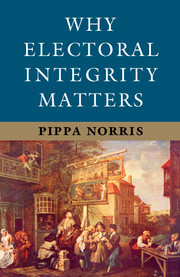Book contents
- Frontmatter
- Contents
- List of Figures
- List of Tables
- Preface and Acknowledgments
- Part I Introduction
- Part II The Problem of Flawed Elections
- Part III The Consequences of Electoral Integrity
- Part IV Conclusions
- 10 Conclusions: Strengthening Electoral Integrity
- Technical Appendix A: Description of Variables and Scale Construction
- Technical Appendix B: Questions in the Expert Survey of Perceptions of Electoral Integrity
- Technical Appendix C: Electoral Context and Background in the Selected Cases
- Notes
- Select Bibliography
- Index
10 - Conclusions: Strengthening Electoral Integrity
Published online by Cambridge University Press: 05 July 2014
- Frontmatter
- Contents
- List of Figures
- List of Tables
- Preface and Acknowledgments
- Part I Introduction
- Part II The Problem of Flawed Elections
- Part III The Consequences of Electoral Integrity
- Part IV Conclusions
- 10 Conclusions: Strengthening Electoral Integrity
- Technical Appendix A: Description of Variables and Scale Construction
- Technical Appendix B: Questions in the Expert Survey of Perceptions of Electoral Integrity
- Technical Appendix C: Electoral Context and Background in the Selected Cases
- Notes
- Select Bibliography
- Index
Summary
During the early 1990s, conventional wisdom suggested that the spread of multiparty direct elections would be one major step in the transition toward democracy; indeed, it was often assumed that elections are both necessary and sufficient for democratization. The “electoralist fallacy” emphasizes the idea that the act of holding elections will automatically channel political action into peaceful contests among elites and give the winner public legitimacy, irrespective of the quality of how they are conducted. Staffan Lindberg provided academic plausibility for this idea by arguing that in Africa, repeated experience of an uninterrupted series of multiparty contests, of any quality, expanded freedom of speech and the press, opened space for opposition parties and civil society to organize and mobilize support, deterred strongman rulers from curtailing civic liberties, and thus gradually strengthened opportunities for democratization. The “electoralist fallacy” continues to be expressed in popular journalistic commentary, for example, when describing Tunisia, Libya, and Egypt as “new democracies” after the first elections following the Arab uprisings. Recent years have tempered the initial heady optimism about the transformative power of multiparty elections, with states now recognizing that elections are necessary, but clearly not sufficient for democratic governance without the development and consolidation of many other institutions, including executive checks and balances, an effective and inclusive legislature, rule of law, an independent judiciary, and a state with the capacity to deliver basic public services.
- Type
- Chapter
- Information
- Why Electoral Integrity Matters , pp. 191 - 206Publisher: Cambridge University PressPrint publication year: 2014

